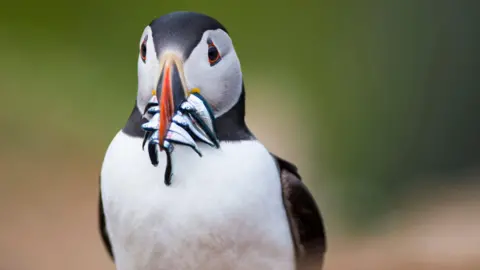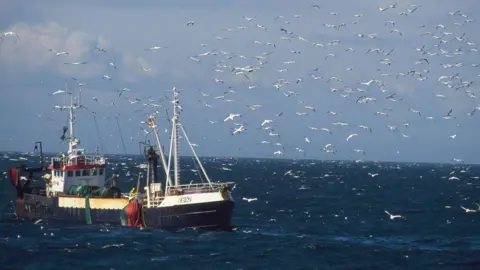UK's puffin protection laws at centre of post Brexit row
 Katie Nethercoat/RSPB
Katie Nethercoat/RSPBThe endangered puffin - one of Britain’s most iconic seabirds - is at the centre of a row over the UK’s post Brexit freedoms.
The UK recently banned fishing in the North Sea for the bird's favourite food, the sandeel. But the European Union is demanding the ban be lifted, claiming it breaches the UK’s post-Brexit breakup deal.
The UK and the EU have until Thursday to find a compromise or risk escalation, something that could eventually lead to sanctions against Britain.
At stake, say conservationists, is Britain's right to choose which wildlife it protects in its own waters.
This is the first time the EU has triggered the dispute mechanism of the UK's breakup deal, the Trade and Cooperation Agreement.
Wildlife campaigners across Europe have reacted with fury at the EU’s demand, with 38 conservation groups pledging their support for the UK ban, including the RSPB, ClientEarth, Oceana UK, Birdlife International, and the Marine Conservation Society.
The ban is also being championed by supporters of Brexit who say it would have been near impossible when the UK was part of the EU because of its laborious bureaucracy and the opposition of other EU members.
David Davis, a former UK Brexit minister, told the BBC: “UK government policy is in both the national and the global interest and Brexit gives us the right to make these decisions by itself.”
Sandeels are small, silvery fish from several species which breed in huge numbers in the North Sea.
They are a favourite food of other threatened seabird and marine species, including seals, whales and dolphins.
Fishing boats from Denmark are most affected by the ban as they catch around 250,000 tonnes of sandeels in UK waters every year – several billion individual fish.
 Chris Gomersall/RSPB
Chris Gomersall/RSPBThey are processed for fish oil and animal feed, particularly for pigs and farmed salmon.
The RSPB has been campaigning to ban the sandeel fishery for more than 25 years, warning sandeels are already under pressure.
They are sensitive to temperature changes and, as the seas around the UK continue to warm, there is evidence they have been migrating north.
"We're absolutely disgusted to see the EU challenging this sand eel closure," said Kirsten Carter, RSPB head of marine policy. "Our seabirds are struggling. We've seen a 62% decline across species, a quarter of our puffins lost, our seabirds need these fish to feed their young and survive."
For its part, the EU says the UK ban does not do enough to balance the needs of marine ecosystems against the well-being of fishing communities.
It says the closure of the UK’s sandeel fishery deprives EU vessels of important “fishing opportunities” and impinges the UK’s “basic commitments” under the Trade and Cooperation Agreement.
A spokesman for the European fishing industry told the BBC the sandeel fishery is well managed already, with quotas in place and a system of closed areas to protect fish when they breed.
"Danish fishermen have been fishing for sandeel sustainably in the North Sea for decades," said Espen Sverdrup-Jensen, president of the EU Association of Fish Producers.
"We were challenging the UK ban because there is no scientific basis for this ban. There is no relationship between breeding success of seabirds and the current fishing management regime in the North Sea," he said.
If the UK and the EU don't come to an agreement by Thursday, the dispute will go to an arbitration panel which will rule on the issue.
If that panel were to find against the UK and the government fails to comply, Brussels could retaliate with tariffs or other measures.

Sign up for our Future Earth newsletter to get exclusive insight on the latest climate and environment news from the BBC's Climate Editor Justin Rowlatt, delivered to your inbox every Tuesday. If you are outside the UK, sign up to our international Future Earth newsletter here.
